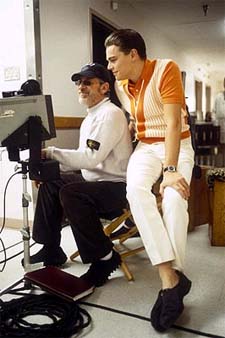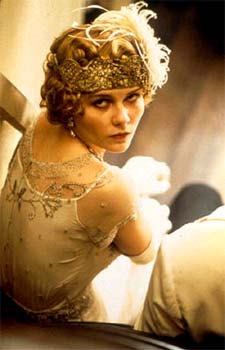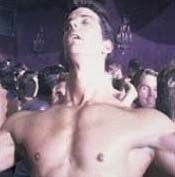
|
No wonder one of the major movie events of the year was the timely re-release of Fritz Lang's silent Metropolis -- in which masses of people are choreographed in gradually-disintegrating geometric, mechanized designs. Metropolis sets the considerable bar over which Spielberg leaps. His is the most miraculous cinematic advance of the age, challenging the rest of the culture to keep up. All that is genuinely great in cinema 2002 achieves its fulfillment in Spielberg -- a beacon to today's artists and audiences. The ambivalence -- oscillating between dulled outrage and utter dismissal -- characterizing popular response to the best new movie artworks is as understandable as the consequences are frightening. To comprehend the state of the world and of the art, recognize the repercussions of a mass audience disengaged from the creation of history and shared narratives, from the construction of culture. Further isolated from each other, from social structures, and from him/herself, the spectator is exposed to manipulation. I use that word purposefully to return it to its true meaning. The fallacious criticism of "manipulation" is exactly the kind of cultural shibboleth -- a programmed cynicism -- that blinds audiences to Spielbergian complexity and empathy. The qualities of complexity and empathy must define artistry in the post-postmodern (post-A.I.) era. In a culture which limits the meanings of images, sounds, words, signs, and lives, the best film artists explore infinite significances -- unencumbered by academic, political, or media paradigms. At their best, film artists like Spielberg expose the interconnectedness of emotional, psychological, social, moral, political, sexual, philosophical, aesthetic, and spiritual significance through selected or manipulated reality.
The most challenging and exhilarating movies identify and resolve social anxieties through vivid movie storytelling. The FrenchTime Out blurs the real and the subconscious to convey the experience of a man out of work, going out into the darkness to define his place in the world. In order to cope with sexual and racial confusion in the media age, Undisputed complicates genre/myth point-of-view while Storytelling demands the spectator's participation in narration. Storytelling is empathy.
To achieve revelatory catharsis at the post-postmodern cinema, the spectator must learn to understand - and to forgive. Relating in this way to film art liberates the spectator, reinvigorating the creative relationship between the audience and its culture. Spielberg developed this vision of the artform by exploring, more than any other filmmaker, the social-spiritual potential of film spectatorship. In 2002, Spielberg with Minority Report and Catch Me If You Can and, catching Spielberg cuz he can, Brian De Palma with Femme Fatale push the limits of spectator cognition and the capacity for cinematic complexity and empathy. These films evoke the moral, political, and spiritual revolution inherent in Spielberg's new -- post-cinematic -- way of seeing the world. The spectator must respond to the eternal, yet urgent, call resonating in every shot of the year's three indisputable masterpieces: "You can choose." The Best Movies of 2002 (that I/eye witnessed): 1. Femme Fatale (Brian De Palma) 2. Catch Me If You Can (Steven Spielberg) 3. Minority Report (Steven Spielberg) 4. Time Out (Laurent Cantet) 5. The Cat's Meow (Peter Bogdanovich) 6. CQ (Roman Coppola) 7. Storytelling (Todd Solondz) 8. Undisputed (Walter Hill) 9. Triumph of Love (Clare Peploe) 10. A Walk to Remember (Adam Shankman) The Best Queer Films of 2002: Borstal Boy (Peter Sheridan) Circuit (Dirk Shafer) The Man I Love (Stephane Giusti) |
|
 Leonardo DiCaprio sits with director Steven Spielberg on the set of Catch Me If You Can, one of Spielberg's critical and commercial hits of 2002
Leonardo DiCaprio sits with director Steven Spielberg on the set of Catch Me If You Can, one of Spielberg's critical and commercial hits of 2002  Kirsten Dunst in The Cat's Meow
Kirsten Dunst in The Cat's Meow  Circuit was one of the best gay-themed films of 2002
Circuit was one of the best gay-themed films of 2002